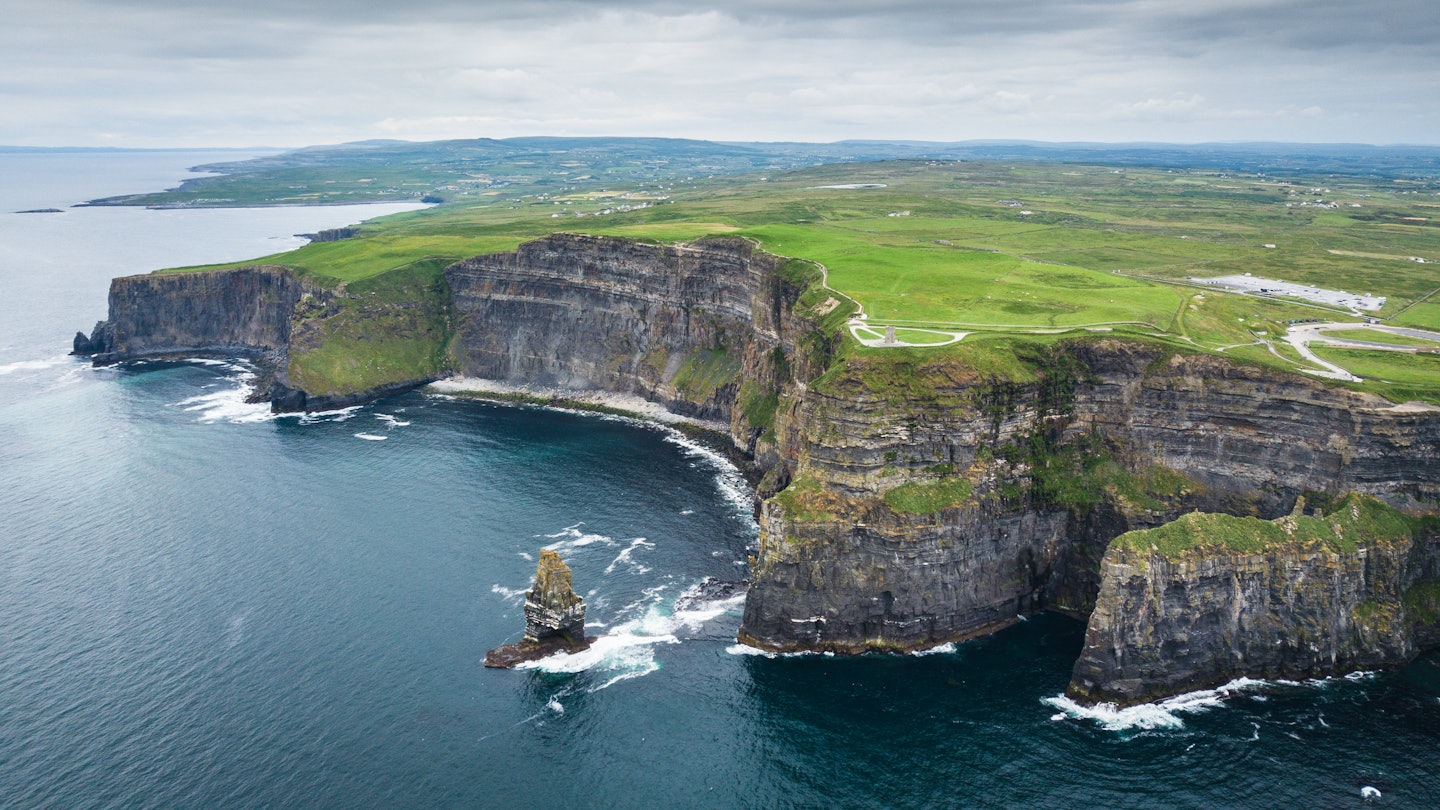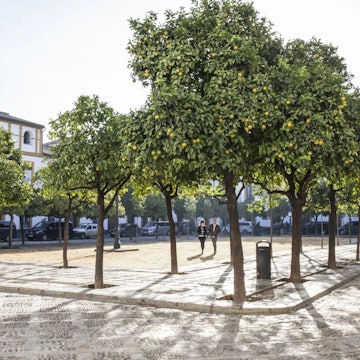
Great reads from Lonely Planet: "Land of the green sheen" by TC Boyle
Mar 21, 2020 • 9 min read

Amid travel restrictions and lockdowns, we’re exploring our catalogue of great travel writing and digging deep into the stories of journeys big and small.
This piece from TC Boyle tells the story of his time living abroad in Ireland. Read more travel essays in the Lonely Planet Travel Anthology.

My mother’s mother was a McDonald, married to a Fitzgerald (though a shadowy Dutchman by the name of Post was ostensibly my mother’s father), and my father’s father was a Boyle. Though I’ve never traced my lineage for fear of what I might find there, I account myself at least half Irish, which is good enough to claim some sort of ethnic identity, and so, in the spring of my fortieth year, in the company of my wife and three small children, I moved to Ireland for a period of three and a half months, just to discover what it would be like to live in the land of my forebears. Unlike most Irish-Americans descending on the Shamrock Isle (Murphys! Are there any Murphys in this pub?), I had no familial connections and no particular destination. I wound up, with the aid of the Irish Tourist Board, renting a grand eighteenth-century house just outside of Skibbereen, on Lough Hyne, where for a brief period I adopted the role of (ersatz) lord of the manor.
"Ah," said they, "a writer," as if that explained everything, and vigorously stamped my passport
Arriving at Shannon Airport in the dim mist of early morning, accompanied by baggage enough for an exploratory expedition to the interior of Africa (baby seats, baby carriers, baby diapers and other infantile accoutrements forming the bulk of it), I found that my initial meeting with the Irish was unpropitious, to say the least. The men at Immigration were of a mind to send us back as refugees who looked to be gaining entry on false pretenses and who would clearly become wards of the state and no doubt beggars to boot, and I let my wife – willowy, sweet-faced, sweet-tempered and above all, reasonable, which I most emphatically in that place and at that hour was not – handle the negotiations. Babies shrieked. The luggage accumulated. The Customs men looked dubious. Finally, exasperated, I explained my business: "I’m a writer," I said. Their faces jumped with recognition, if not outright joy. "Ah," said they, "a writer," as if that explained everything, and vigorously stamped my passport and that of my wife and children, including the smallest baby, whose passport photo featured the image of a very large hand (mine) propping him up.
What followed, after the exhaustion of the all-day, all-night journey from Los Angeles, was the pre-Google searching out of the path to the rented house down a succession of miniaturized Irish roadways, and all of it while driving on the opposite (wrong, that is) side of the road.
When we finally arrived, the local farmers, Mary and Paddy Burke, who were in charge of maintaining the house and farm for the absentee landlords, showed us around. The house was six times the size of the one in which we dwelled in sere, sun-blasted Los Angeles, with a grand entrance hall and various parlors and a library lurking about, as well as a succession of mysterious wings. I’m sure Mary Burke was sizing me up as she showed me around, coaxing out the details of the utilities and the linen closets and such, while already, above us in one of the bedrooms, babies howled themselves to sleep. Outside the windows, on the vast rolling lawns that gave on to Lough Hyne itself, were perhaps a dozen cows. I said to Mary, suckering her in: "You know, I’m not really all that familiar with livestock – tell me, when it rains, I’m supposed to bring the cows into the house so they won’t get wet, right?" She let out a laugh and we were instant friends. She was Irish and so was I.
The next matter of importance, if not survival, was my daughter’s schooling. Kerrie was then in second grade and she had a full seven weeks left to go in the semester when we unpried her from the grasp of the Los Angeles school district and rudely dragged her off to the land of the green sheen.

Accordingly, on the day after our arrival, I telephoned the Master of the Rath School in Baltimore (Baal-tee-már), Michael Collins, and explained our situation to him. We were not taxpayers, we were not citizens, but our daughter required schooling and could he help us? "Bring her over," he said, and the next day, following his directions, I drove the rented car over an unpaved road with a stripe of shin-high grass sprouting down the middle of it for fifteen minutes or so, doubtful, very doubtful, nothing but sheep and green hills and the occasional farmhouse to guide us, but then, mirabile dictu, the Rath School appeared at the bottom of a long deep-green hill, set there like a beacon against the pound and slash of the ocean. Michael himself greeted us. "Give her half a day," he said, "and see how she adjusts." When I returned to pick her up, the entire schoolyard rushed to the car to wave her farewell, the chorus of children’s voices crying, "Goodbye, Keddie, goodbye!"
It was my first taste of living abroad and I was deeply gratified, enchanted even...
What am I trying to say here? That the Ireland of my experience was a relaxed and welcoming place, the diametrical opposite of smogchoked, freeway-clogged LA, that the Burkes were a delight and that Michael became – and still is – one of my closest friends. And that because we were living in a village and had a child in school alongside the children of the local residents, we fell into a way of life that was very different, I expect, from what the average tourist (Murphys? Any Murphys here?) might come to experience. It was my first taste of living abroad and I was deeply gratified, enchanted even, LA instantaneously relegated to another sphere altogether.
There were the cows. There was a bower of rhododendrons leading to the lough, there was a rowboat, there were fields, a long winding gravel drive, a series of ancient iron gates to keep the cattle out of one field/garden or another. And there was the mailman, whose presence and practice were vital to me then, as I was plowing through proofs of an enormous novel at the time as well as sending out stories to various magazines. After pulling open the cattle gate at the base of the long drive each morning, he would placidly drive through, stop to close the gate behind him, re-enter his car and wend his way up the hill to the house, where he came silently into the grand entrance hall to lay the letters on the table there. Best of all, it rained, rained constantly, and this was no small consolation to a writer having to contend, day after interminable day, with the riot of sunshine that was LA during the scorch of summer.
I worked up the courage to try the most rustic-looking pub...
If this was writing weather (and I was productive during my time on Lough Hyne, composing most of the stories that would comprise my third collection, If the River Was Whiskey), it was also drinking weather. In that era, Skibbereen was a town of some 3000 souls and featured, give or take, seventy-odd pubs. I can’t say I visited them all or even half of them (all right: a third maybe), and of course, there were pubs in Baltimore and Skull that merited a timely stop or two, but I quickly found the ones that truly sustained me. At first, being a foreigner and not knowing quite what to expect by way of reception, I was chary of entering them, but soon got over that. I’d been there a few days when I worked up the courage to try the most rustic-looking pub, set down a stone alley decorated with fifty or so shining and neatly stacked aluminum kegs. My wife was with me, and since I wasn’t sure whether or not the sexes were segregated in the bars then (in one, men unaccompanied by females were confined to a separate room, owing, I imagine, to bloody historical encounters), I tentatively pulled open the door and peered inside. This was a long narrow place, featuring perhaps ten or twelve bar stools in a rigid line. Each was occupied by a farmer in a tweed jacket, a tweed cap and the black gumboots they all wore as a matter of practicality (rain, mud, ordure). And each of them was a twin of rapier-eyed, savage-beaked Samuel Beckett. They all turned their heads as one, and I, thinking of Vladimir and Estragon, backed quietly out the door and eased it shut behind me.
A week later, when I was more acclimated and knew the girl at the bank, the greengrocers and all three butchers, I went back to that very pub, clapped on my beret and had a good raucous time, looking, in the dim mirror over the bar, faintly Beckettian myself. I remember the wait for a pint of Guinness while it settled into its perfect blackness with its half inch of creamy foam on top, and the little glasses of John Powers whiskey that by necessity accompanied it. And the music. The music was a constant, and on the very rainy day that washed out the school parade and community fest on Clear Island, we all crowded into the three pubs there and everyone spontaneously broke into song, accompanied by the odd mouth harp, banjo and set of clacking spoons. Most of all I remember the silence that fell over the wet fields and the misted lough and the grand old house too, the five us sitting around the peat fire for story time, all well, all right, in a time longer than time.
Was the trip life-changing? No...it was just life-living.
Was the trip life-changing? No, not in the sense that my discovery of Flannery O’Connor or John Coltrane was – it was just life-living. I re-read Joyce that summer – Dubliners, Portrait and Ulysses – and I attended a performance of Synge’s The Playboy of the Western World at a tiny stone community building on Sherkin Island and for the first time really, actually got what it was all about. Was that life-changing? I suppose so. But then so is every experience, every moment, including this one, as I sit here all these years later, seeing Ireland in the synapses even as I stare out at a stormy sea on the Central Coast of California. The point is that while I’ve been back to the Isle many times since, it’s always been on business – book business – whereas for those glorious three and a half months, I was able to live and write and truly inhabit a place that was at once foreign and familiar too. And that made all the difference.
You might also like
How to learn a language without leaving your house
Turning myth into reality: the white lions of Timbavati
How learning Gaeilge in Ireland expanded more than my vocabulary















